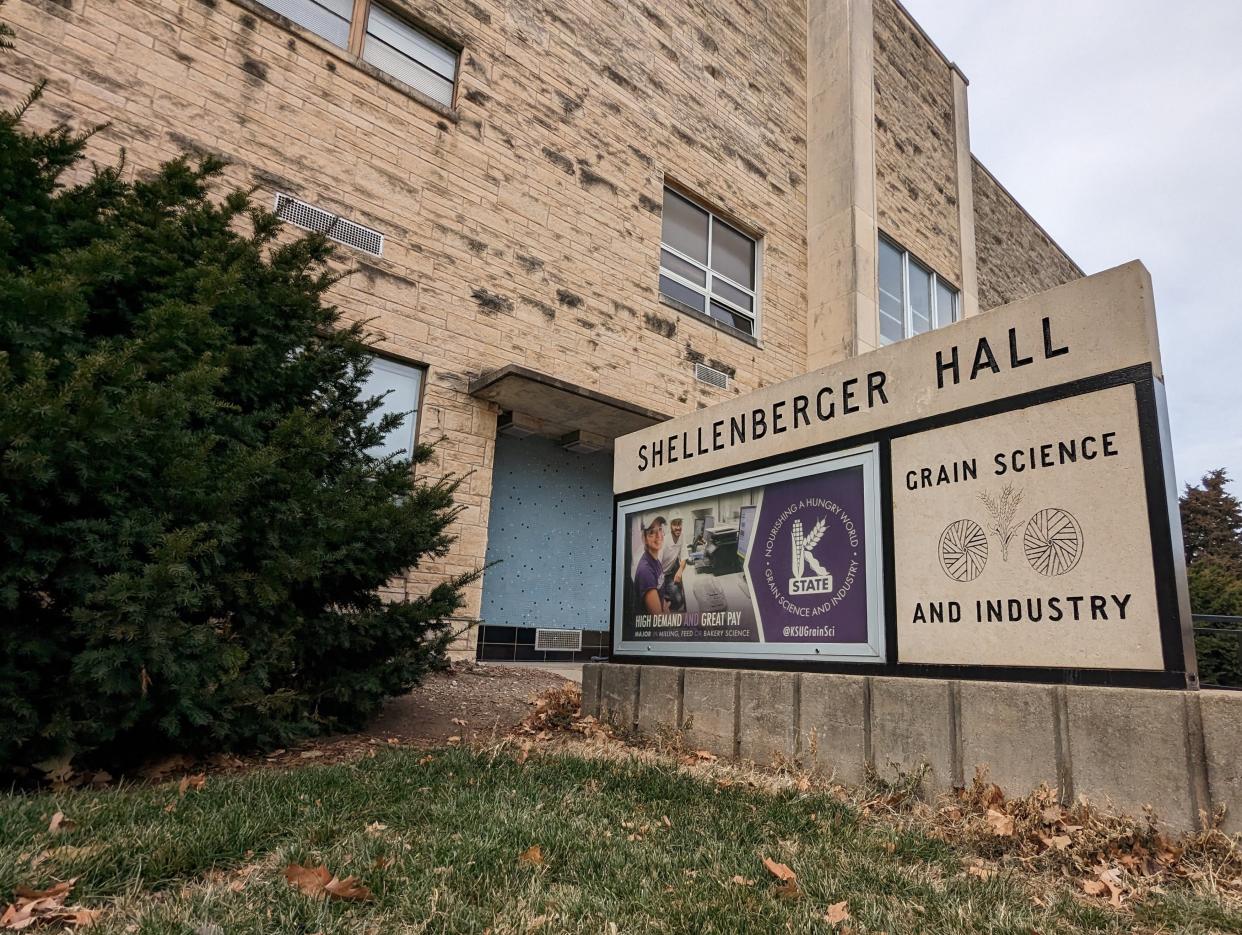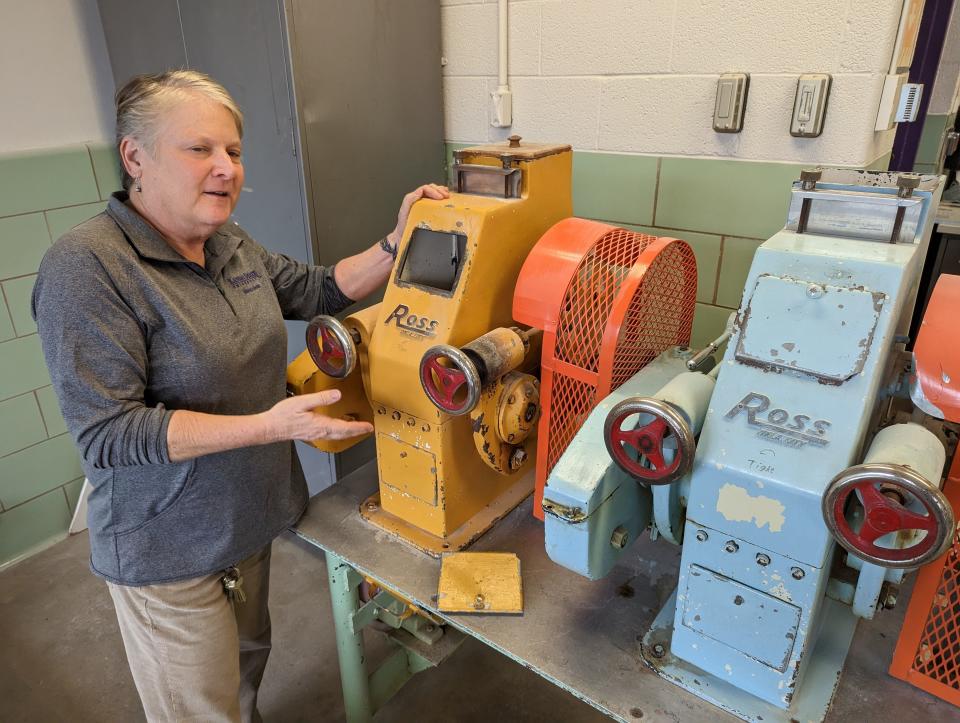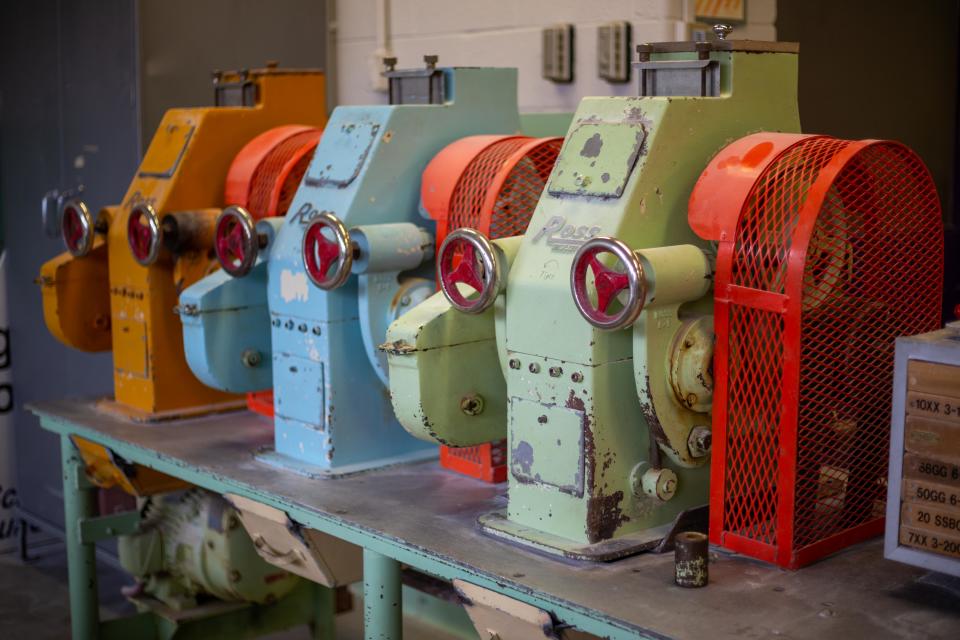$75M fundraising blitz could lead to brand new face for K-State's College of Agriculture

Ernie Minton has always known that the facilities at Kansas State University's College of Agriculture could be in better shape, but it still disappointed him to see that the university had somehow become a poster child for rundown spaces and deferred maintenance in agricultural schools.
As part of a 2021 study looking at the dilapidated state of many of the nation's colleges and schools of agriculture, not one, but two photos of facilities at K-State's College of Agriculture had been picked as cover photos to demonstrate the critical state and need for repairs in such facilities.
Minton, the college's dean, had mixed emotions.
"There’s a nationwide problem with deferred maintenance at land-grant institutions, but it was perhaps unfortunate that two facilities from K-State made the front cover," he said. "The flip side of that is it demonstrates pretty graphically how bad some of our spaces are, and those are some of the first ones we’re hoping to replace."
More:Ukrainian agriculture expert taking refuge in Kansas says worst to come for world food supply
So when officials at K-State's College of Agriculture earlier this summer became aware of state funding programs that could inject millions of dollars in capital funding, they knew they had to act quick to raise $75 million in less than six months to qualify for a 1-to-3 matching program that could provide $25 million.
And while some donations aren't yet totally finalized, Minton on Wednesday told The Capital-Journal that it appears the College of Agriculture will reach its $75 million goal ahead of a December deadline to apply for the matching funds.
Combined with a separate, $25 million grant in state funding that Minton is hopeful the college could receive, a total of $125 million could kickstart the College of Agriculture's long-term plans overhaul its facilities, starting with the razing and replacement of Shellenberger Hall and the construction of new agronomy facilities on the north end of campus.
"It is an unprecedented rate of fundraising," Minton said of the fundraising blitz. "But it’s a good sign, because it suggests that our alumni and stakeholders who have contributed feel this is a right thing for us to do."
More:This Kansas State research program is helping HBCU students become agricultural scholars
Plans in the work to raze K-State's Shellenberger Hall

Of the college's older buildings, Shellenberger Hall — home to K-State's one-of-a-kind, baking, milling and feed sciences programs — was in most desperate need of replacement, and it made sense as a first priority in a list of over $400 million in estimated deferred maintenance projects, Minton said.
Built in 1960, the academic building has only become more difficult to keep up, and a recent report by the Kansas Board of Regents gave the building an F for its deteriorated condition and long backlog of deferred maintenance.
Opinion:Kansas universities can address deferred maintenance issues by leasing space to companies
A key component of the fundraising blitz focused on finally starting long-made plans to raze Shellenberger, including the feed technology facility inside it, and build a new grain and milling science facility between Call and Weber halls.
That would create a type of agricultural hub on the north end of K-State's campus, Minton said, and the proximity of the buildings would no doubt encourage interdisciplinary collaboration with animal and food scientists located in Call and Weber halls, which are also slotted to eventually receive renovations of their own.
It could help create a new face for the College of Agriculture, the dean said.
"I think it’s bound to become an important focal point for students, especially because of the size of the undergraduate animal science program," he said. "Especially when you add the students from grain science, that’s over half of the students in the college."
Separately, the College of Agriculture also plans to replace and renew some of the facilities on its agronomy farm north of the football stadium. After the City of Manhattan widened the Kimball Avenue and restricted some of the access the farm's vehicles previously had, the College of Agriculture decided to sell 16 acres of land to the KSU Foundation, and proceeds from that sale — combined with fundraised dollars and any state funding — will help pay for the upgrades.
Minton said the project as a whole will serve as a test of sorts to evaluate the value of renovations versus demolition and new construction.
"(Shellenberger Hall) is just not well-suited for renovation, and the costs to renovate would far exceed the value of retaining those buildings," Minton said. "That’s not the case with Call and Weber halls, and it’s not to say renovations are inexpensive, but it makes more financial sense to renovate those halls."
Milling science will be a big part of K-State College of Agriculture's new facility
Fran Churchill, a professor of practice in the Department of Milling Science and Management, gets a kick out of showing undergraduate students how to use the school's rolling mills, because they're the same ones that she used as a student about 40 years ago.
While those machines have served the department well, companies and mills in the real world have in recent years trended toward buying new equipment. In a major like milling sciences, where most every class has an associated lab, it's crucial to have students working on reliable machines like the ones they might encounter in the industry.
More:Gov. Laura Kelly freezes tuition at state universities for 2022-23
"It really affects and limits us on what we can teach," Churchill said. "This equipment just doesn’t always work the best."
One of the biggest reasons to replace Shellenberger is because of huge industry demand for the department's graduates. Companies around the world specifically recruit K-State students, and every fall, virtually all of the department's students are either hired at jobs that start between $70,000 and $75,000 or placed in internships that pay $25 an hour plus living expenses.
Compared to hiring engineers from generic backgrounds, companies prefer K-State's graduates because they are already familiar with the intricacies of milling, the professor said.
"Companies love that they don’t have to stop and teach them milling," Churchill said. "They can hit the ground running, and within a year or two, they’re often department heads in a manufacturing or grain processing facility."
The challenge for K-State, then, is in supplying those students. As with most every other major and department, enrollment has been challenging, although the department has been steady at about 40 total students and eight to 10 graduates every year, Churchill said.
More:Kansas' colleges, universities continue to see downward enrollment spiral — with a few exceptions
But the industry would easily hire three to four times as many, and the hope is that a new facility could serve as a recruitment tool for undergraduates not just from rural or agricultural Kansas backgrounds, but from urban and out-of-state locations.
"I hate to see (Shellenberger) go, but the thought of a new facility is pretty exciting," Churchill said.
K-State College of Agriculture will continue fundraising for new projects

After years of discussion on replacing Shellenberger Hall and beginning other capital projects, Minton said it's difficult to believe the college is on the cusp of starting on those ambitions.
He credited the groundswell in support to the enthusiastic and informed efforts of a new university president — Richard Linton, who was previously dean of the College of Agriculture and Life Science at North Carolina State University — as well as big donors and stakeholders in the college, such as the Kansas Farm Bureau, the Kansas Soy Bean Commission and other grain and commodity commissions around the state.
"It's relationship-building that has occurred over the last 20 years," Minton said. "They have to have the confidence that we will deliver, and that takes years of building trust."
Minton emphasized, though, that the fundraising will continue, especially as the college begins to pivot to design and construction work and determines more accurate costs for its projects. The matching funds, if granted, would have to be expended by December 2026, and that is a relatively short time to design and build a new facility.
But Minton said the college is taking an approach that looks decades, not years, into the future.
"As we design this building, we’re not building this building for 2023 or 2024 or 2025," Minton said. "We’re building for 2030 and beyond, maybe even to 2050, when the global population reaches 9 to 10 billion people. There’s going to be a tremendous global demand for calories and protein, and the Department of Grain Sciences and Industry, and the innovation that will occur in that building, should really help on the plant-protein side."
Rafael Garcia is an education reporter for the Topeka Capital-Journal. He can be reached at rgarcia@cjonline.com or by phone at 785-289-5325. Follow him on Twitter at @byRafaelGarcia.
This article originally appeared on Topeka Capital-Journal: K-State College of Agriculture looking to build new milling building

